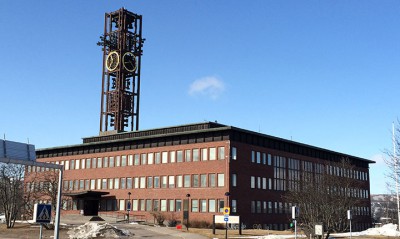No-one can say that people in Kiruna make a fuss. The town is falling into a pit and no-one complains. It’s a less well known fact that the local council could have stopped the mine but they chose not to.
What makes people so tolerant? We’ve wondered about this over the years. There’s an acceptance of change beyond anything we’ve experienced anywhere else. What could be the reason?
For one thing, the natural environment provides endless practice at dealing with change. Living here you have to adapt to rapid seasonal changes, total darkness to total light, a landscape that seems frozen and dead, changing to a landscape that’s rampant with vegetation and wildlife. Sami people say there are eight seasons here, not four.
Then there’s simply the impact of living in Kiruna – a town constantly having to adapt to the demands of the mine. People come to expect some destruction, see it as part of the natural process of life. In the ’60s people lost forever the streets and buildings of their childhood when a large area of town became unstable. That community then settled in other areas, knowing the process would probably be repeated during their lives.
We all know life is about change and yet in many places, including where I’m from, we spend a lot of time and energy trying to deny it, seeking out ‘security’, ‘roots’, and the comfort of a familiar home environment. ‘Our home is our castle’ and we dig ourselves in, reassured by the familiar. When someone tries to change that – redevelop our street, build a kitchen extension in our view, knock down an old cinema and replace it with a shopping centre – we object, we get stressed and angry, and when we can’t prevent it we find it hard, mentally, to move on.
In Kiruna expectations are quite different. People seem to know that it’s pointless looking for that sort of security. But there’s something else going on here as well, a particular adaptation in people that I’ve observed – and even experienced for myself – which perhaps explains how Kiruna people cope. I call it, ‘Jazz Thinking’.
To explain this, I’ll tell you how I feel about the town hall. Kiruna’s town hall is one of my favourite buildings and it has also been one of Sweden’s most valued buildings, with a cultural protection marker on it. This year, however, destabilised by the mine, it will be demolished. It’s a crime, I think, to destroy such a wonderful building, and it makes me very sad to think of losing it.
Late last year, in preparation for the coming demolition, the council removed the building’s remarkable clock tower and erected it at the site of the new town hall. The exterior of the old town hall building has always been rather unexceptional, apart from this tower, so now the tower is gone, the building, on the face of it, looks just like a giant brick bus stop.
Except that a weird thing happens when I look at it.
I can still see the tower!
In jazz an instrument probably isn’t playing the tune – it’s improvising around a melody or a rhythm which you have heard before. As you listen you hear the original tune in your head when the improvised version is played for you. The two things work together – your memory of the music, and the musician’s version of it.
This is what happens when I look at the town hall. I see the damaged building in front of me, and yet at the same time the town hall as it used to be – with its clock tower still in place – keeps playing in my head.
Though sometimes it isn’t just in my head. When we came back to Kiruna after some time away last year, we found that several of the old buildings were now in a completely different part of town. You look at them – the old wooden building where the mine’s first Director once lived, for instance – and it is so familiar, and yet, not. It’s in the wrong place! A building from 1910, in a part of town where no-one lived in 1910.
There’s a short film running in the background. Buildings move effortlessly about the town, looking for a home. When you turn your back on them, they’re scooting off round the corner searching for a better outlook. A clock tower floats off down the road to move to another site, another building, and attaches itself in an instant. A whole street relocates – vanishing quite suddenly.
We’ve noticed local townspeople often refer to places and buildings by what used to be there, which can be very confusing for newcomers. So when you’re told something will take place ‘at the old supermarket’, or ‘the old fish factory’ you can feel a bit irritated, not knowing anything about these places. But now I see that this is just a way of keeping the old buildings and memories alive.
They can knock down buildings but they can’t change shared memories and visions. The collective virtual reality of Kiruna is always playing in the background. Passing the site of Kiruna’s original station, I smile to see its majestic brick exterior still towering over me. ‘Jazz Thinking’ – it’s magic.


